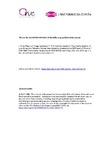Practical Evaluation of Low-Frequency Vibration Energy Harvesting for Creating Green RFID and IoT Devices

Use este enlace para citar
http://hdl.handle.net/2183/39891Colecciones
- Investigación (FIC) [1679]
Metadatos
Mostrar el registro completo del ítemTítulo
Practical Evaluation of Low-Frequency Vibration Energy Harvesting for Creating Green RFID and IoT DevicesFecha
2024-07Cita bibliográfica
I. Froiz-Míguez, P. Fraga-Lamas and T. M. Fernández-Caramés, "Practical Evaluation of Low-Frequency Vibration Energy Harvesting for Creating Green RFID and IoT Devices," 2024 IEEE International Conference on RFID (RFID), Cambridge, MA, USA, 2024, pp. 1-6, doi: 10.1109/RFID62091.2024.10582773
Resumen
[Abstract]: One of the main limitations for the development and deployment of many Green Radio Frequency Identification (RFID) and Internet of Things (IoT) systems is the access to energy sources. In this aspect batteries are the main option to be used in energy constrained scenarios, but their use is limited to certain cases, either because of the constraints imposed by a reduced-form factor, their limited lifespan, or the characteristics of the environment itself (e.g. operating temperature, risk of burning, need for fast response, sudden voltage variations). In this regard, supercapacitors present an interesting alternative for the previously mentioned type of environment, although, due to their short-term capacity, they must be combined with an alternative energy supply mechanism. Energy harvesting mechanisms, in conjunction with ultra-low-power electronics, supercapacitors and various methods to improve the efficiency of communications, have enabled the emergence of battery-less passive electronic devices such as sensors, actuators or transmitters. This paper presents a novel analysis of the performance of an energy harvesting system based on vibrations for Green RFID and IoT applications in the field of maritime transport. The results show that the proposed system allows for charging half of a 1.2 F supercapacitor in about 72 minutes, providing a stable current of around 210μA and a power output of 0.38 mW.
Palabras clave
Energy harvesting
Green RFID
Green IoT
Ultra-low power
Battery-less sensor
Supercapacitor
Piezoelectric
Harmonic motion
Green RFID
Green IoT
Ultra-low power
Battery-less sensor
Supercapacitor
Piezoelectric
Harmonic motion
Descripción
This is the Author Accepted Manuscript; this version of the paper has been accepted for publication. The final published paper is available online at: https://doi.org/10.1109/RFID62091.2024.10582773.
Versión del editor
Derechos
© 2024 IEEE. Personal use of this material is permitted. Permission from IEEE must be obtained for all other uses, in any current or future media, including reprinting/republishing this material for advertising or promotional purposes, creating new collective works, for resale or redistribution to servers or lists, or reuse of any copyrighted component of this work in other works.





